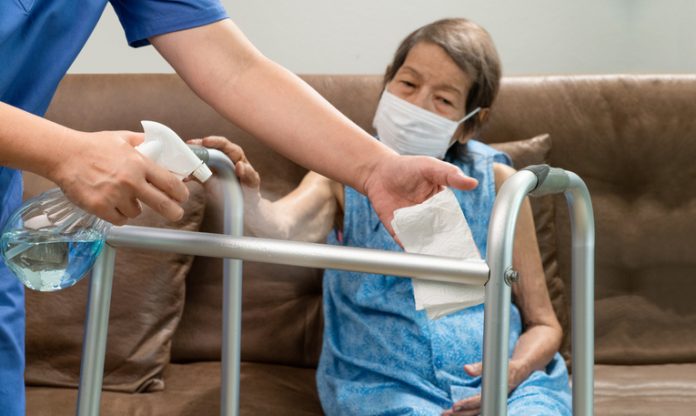As the United States draws closer to its one-year anniversary since the start of the COVID-19 pandemic, Native Americans continue to struggle to find safe treatments and trust in the vaccine.
A Morbidity and Mortality Weekly Report published on August 28 by the Centers for Disease Control and Prevention (CDC) found that American Indians and Alaska Natives were 3.5 times more likely to be diagnosed with COVID-19 than non-Hispanic white Americans. The latest data from the CDC shows the age-adjusted COVID-19 hospitalization rates for indigenous Americans are now more than five times that of non-Hispanic white Americans.
COVID-19 data on races and ethnicities, particularly with the Native American community, is not widely consistent nor routinely recorded by hospitals or local governments. A recent New York Times report showed that the rate of cases in eight counties with the largest numbers of Native Americans was almost double that of the national average.
Though the exact mortality rate is unknown, the Indian Health Service (IHS), the federal agency that provides health care to all Native communities in the United States, reports that more than 162,719 Native Americans have tested positive for COVID-19 as of January 12, 2021.
Denial of Treatment to an Already High-risk Population
Although the new COVID-19 vaccines provide hope in preventing infection, they are of no help for individuals already sick with the virus. Globally, medical providers have found other approaches to control the pandemic—in particular, treating COVID-19 patients early with vitamins and low doses of existing drugs approved by the U.S. Food and Drug Administration (FDA).
Hydroxychloroquine (HCQ), one such drug, has been used for decades to treat malaria and even autoimmune disorders such as lupus. But in June, the FDA and the National Institutes of Health (NIH) took extraordinary action speaking against its off-label use for COVID-19 outside of clinical trials.
Just weeks into the pandemic, state governments across the country partnered with state Boards of Pharmacy to limit, restrict, or outright ban off-label use of HCQ in outpatient settings during the early stages of infection. Because of those actions and agencies’ drug guidance, health care providers, particularly those at government health agencies such as IHS, won’t prescribe HCQ despite its promising success.
“Denial of access to possible early treatment modalities, specifically in a population that is at extremely high risk, due to high percentages of obesity, diabetes, high incidence of alcoholism, and rampant diabetes, hypertension, hyperlipidemia, and heart disease, is contributing to mass causalities among Native Americans,” said Elizabeth Lee Vliet, M.D., a physician from Arizona who works closely with indigenous populations. “Denial of access to hydroxychloroquine specifically, which is known to reduce the risk of hospitalization and death from COVID-19, improve glucose control, A1C, and improve lipids, has been detrimental.”
Vliet says IHS has been more open to treating COVID-19 in the hospital with the new COVID-19–infused anti-viral drug, remdesivir.
“This drug has a high percentage of liver toxicity and Native Americans have a high incidence of alcohol-induced liver damage,” Vliet said.
History of Mistrust
Making matters worse for Native Americans is the broken trust created by a long and dark history of government mismanagement and abuse. That distrust has affected the community’s trust in the COVID-19 vaccine.
In the 1860s, the Bureau of Indian Affairs created boarding schools on Indian reservations that separated children from their families. In the 1960s and 1970s, the IHS, in collaboration with physicians, commonly practiced performing sterilizations on Native women without their informed consent. In some cases, women were even misled into believing the sterilization process was reversible. Between 1970 and 1976 alone, it was found that anywhere from 25 to 50 percent of Native women were sterilized. In 2003, the Havasupai Indian tribe sued Arizona State University for misusing blood samples from a diabetes research project in the 1990s.
COVID-19 presents more potential for damaged relations because mortality rates are highest for seniors. For Native Americans, the “elders” are reservoirs of history, language, and traditions for Native communities. Poorly thought-out health policies not only add to the potential health risk to their elderly but put the community’s very culture and way of life at risk.
“We’ve lost over 1,000 of our dear elders,” Myron Lizer, vice president of the Navajo Nation told Health Care News. “We don’t want to go through this again.”
Lizer said the only drugs IHS is using for COVID-19 are remdesivir and the monoclonal antibody bamlanivimab—treatments that must be administered in a hospital setting. As for existing drugs for either preventing infection or slowing down virus replication before someone is sick and needs to go to the hospital, Lizer says there has been less openness.
“We have tried to facilitate discussion of HCQ and ivermectin and we’re still working on it,” Lizer said. “A multi-collaboration between us and the powers that be has to happen. We have to work around the politics and the bureaucracy.”
Vliet says it is a mistake to not use all approaches to manage the pandemic in the Native American population, especially early treatment with existing drugs that have a history of safety.
“Forcing [Native Americans] to have mass vaccination with a novel vaccine with new technology we’ve never used before, and that is not well delineated on safety and effectiveness, is another magnitude of risk to this already high-risk population,” Vliet said. “Some may say genocide is too strong a word. But when you look at the entire picture of what is being done to the Native Americans through IHS policy decisions, it certainly raises that specter.”
Richard Larkin McLay (rjlarkinmclay@gmail.com) writes from Minneapolis, Minnesota.




















